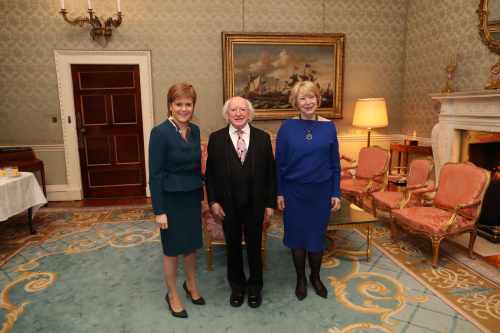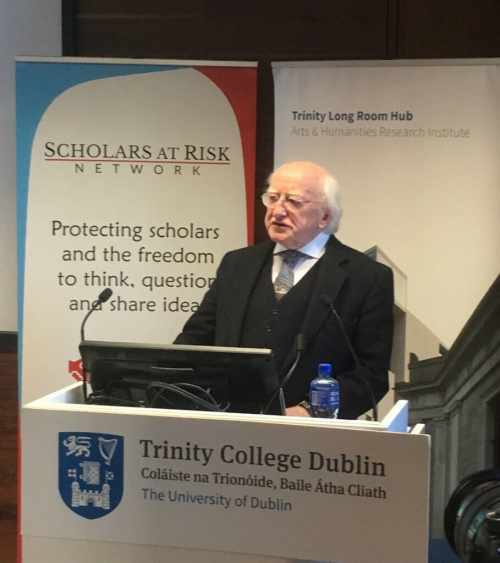Sabina Higgins speech opening the Women of Faith - Channels of Peace and Dialogue Conference for the Sisters of Faith for Peace
Mansion House, Dublin, Monday 28th November, 2016
I am very pleased to be here with you this evening and I would like to congratulate the Sisters of Faith for Peace for organising this important conference ‘Women of Faith – Channels of Peace and Dialogue’. I wish to thank Doris McCann and the Committee Members for inviting me to come here this evening. May I also thank all of you for your warm welcome.
I would like to pay tribute to all of you here this evening for the time and dedication you continue to give to bring peace and dialogue not only into your own community but into the whole of society.
It is more important than ever that we undertake conversations that include everyone. It is only through talking with each other that we can create an understanding of each other and create an environment that is healthy for people to live in.
Dialogue encourages a freedom of inquiry that is marked by maturity and respect. If we are to succeed in our efforts to eliminate war, violence and inequalities of every kind we will need to discuss and decide things on a collective basis. If we are to save the human race and our fragile planet, and put an end to atrocities, we must encourage everyone to get involved, and to keep an open mind. The thread of dialogue must always the kept alive. The channels of communication must always remain open.
It is crucial to have an informed understanding of each other’s belief systems and our different ways of viewing the world. A lack of knowledge of history or context can serve to fuel ignorance and distortion. This illustrates the importance of gatherings like the one we are undertaking today.
In every belief system we encounter the concept of dignity – the dignity of the human person. This surely is a good starting point for dialogue.
We must celebrate the efforts that have been made in the work of promoting Peace during the past year. We are all aware of the troubled world we live in, beset with conflicts and humanitarian catastrophes. On our planet about 60 million people are displaced fleeing conflict. We have the tragedy of the boat people in the Mediterranean forced to move because of climate change disasters, political instability and economic necessity for survival.
There are disasters caused by acute poverty and gross inequalities. The world has become more divided as the gap between the rich and poor has reached an unsustainable level. Meanwhile there is a hardening of anti-immigrant feeling and an increasing number of borders being closed. There is the dreadful suffering that is endured by the refugees on their horrific journey and again when they reach the refugee camps.
(Women suffer most in all these circumstances)
The tragedies we witness represent moral challenge to humanity. The situation as it stands is unsustainable and the rise of xenophobic and hard right politics in Europe is a cause for great concern. There is no remedy other than a global solution. The United Nations is our best hope for guidance but it must be fully supported, it must be much strengthened and given adequate funding. The UN have been working tirelessly and seeking solutions and have had some success. It has been calling on the world agencies of government and societies to cooperate in the bid to eradicate poverty.
In 2000 the United Nations reached agreement from World Leaders about the Millennium Goals – A 15 year programme for the eradication of poverty and the empowerment of women.
This achieved some success and a variety of legislation on Women’s rights was enacted.
Since we met in Clonskeagh last year two great historic global events took place that put in place one universal agenda for all the countries of the world.
In New York at the United Nations, 200 countries of the world came together and signed their commitment to the Sustainable Development Goals, and in November in Paris, at the Climate Change conference, 196 countries adopted the first ever universal, legally binding climate deal.
The survival of the planet depends on the implementation of the agenda of the Sustainable Development Goals and the Climate Change Justice agendas.
The 17 Sustainable Development Goals are a set of goals to end hunger, poverty, protect the planet, empower women and ensure education and prosperity for all as part of a new sustainable development agenda. Each goal has specific targets, 169 in total, to be achieved over the next 15 years - by 2030.
But if we are to achieve any of our global goals, we must seek to define new models of economics that are connected to ethics and are ecologically responsible and create new world institutions that are accountable, transparent, and rooted in democratic participation.
As global citizens we must all be enabled and be willing to play our role in becoming informed participants, willing and able to engage in discourse, on the creation and implementation of such models; courageous citizens prepared to challenge, to question and to explore better alternatives.
I think that the part that can be played by civil and religious leaders in encouraging the achievement of the Millennium goals is unlimited. The survival of humanity and the planet depends on our becoming informed, and having understanding and cooperation in bringing inclusion and cohesion to the human family. I know that many church leaders are concerned and have spoken out and that Pope Francis has been inspirational in his efforts and advice.
In that pursuit of a better world we must place, right at the centre of our vision, the full implementation of human rights. We remain confronted, across the world, with dramatic situations of conflict which create unspeakable and unacceptable levels of human suffering and injustice.
Much in that overall narrative pertains to an overwhelming and persistent global injustice against women
Oxfam Ireland has stated that gender inequality lies at the heart of the gap between the richest and poorest people in the world.
Women are left highly dependent and vulnerable to poverty abuse and terrible levels of violence in many parts of the world.
Gender-based violence is very much a global issue. The scale of the problem in many countries around the world remains daunting, whether it takes the form of domestic violence, rape, sexual harassment, sexual violence during armed conflicts, forced marriages, trafficking women, forced prostitution – the list is sadly very long, and female genital mutilation remains a problem.
Gender Based Violence is a worldwide problem and is particularly detrimental to a country that has a macho culture. A great impact has been brought by advanced legislation, where women are made aware that it is illegal and they can seek help, that is of course if help is available and if they know where it is available.
Many efforts have been made to encourage education initiatives aimed at young people and at men. The movement for gender equality was originally conceived as a struggle led only by women for women. The United Nations HeforShe campaign is a solidarity movement for gender equality that brings together one half of humanity in support of the other half for the benefit of all. Men and Women are encouraged to sign up to the UN HeforShe app on the internet.
Gender and domestic violence are prevalent all over the world and at all levels of society. Here in Ireland in one year almost eleven and half thousand women and children received support from the domestic violence services. And in 2013 46,000 help line calls were answered, and 3 and half thousand requests for emergency refuge went unmet because the refuges were full.
The last EU survey on domestic and sexual violence conducted by the EU Fundamental Rights Agency launched in 2014 showed that 394,325 women in Ireland have experienced physical and sexual violence by a partner or non-partner.
Structures of violence have historically become imbedded in cultures. I feel that faith spaces are places were necessary and courageous discussion on gender violence can be initiated and developed.
These spaces can be agents that ensure that women’s voices from all faiths are being heard.
I was listening to a most powerful and wonderful women Edna Adan who has a maternity and teaching hospital at Hargeisa, Somaliland.
She was speaking on Saturday, 26th November on Newstalk – the programme, The World in Motion - during her visit to Ireland and other countries.
It can be accessed on their podcast. Her web address is www.ednahospital.org
She is 79 years of age and is a nurse and midwife and has worked with the World Health Organisation. She has dedicated her life to maternity services for mothers and children and in particular through efforts to eradicate Female Genital Mutilation.
Female Genital Mutilation is the most dreadful cruel torture inflicted on little girls in their community, by the women of their family and their community. In the most severe type 3 mutilation, while the child is held down, all the little girls genitalia are cut away and then she is sewn up so that only 5cm or a match stick size opening is left for urine and menstrual fluids.
The trauma experienced and the serious health and psychological effects that result from this make it a Human Rights issue and it has been declared as such. This female circumcision, as it was known, was not and is not an obligation of any religion, it is a cultural tradition. The practice has universally been declared as illegal but this has met great resistance because of the deep cultural ties that propagated the practice. It is a very sensitive matter. It is practiced in more than 20 countries and it is estimated that 130 million women and girls have experienced FGM and about 2 million or more are expected to experience it each year.
What is so heart breaking and devastating is to know that this is all unnecessary suffering being inflicted through lack of understanding.
The problem cries out for, and desperately needs, remedy. It is unbearable to think of all this suffering. Edna seemed to suggest that if there were adequate maternity and child services available with mid-wives trained and committed, and with mid-wives on
out-reach work who would visit women in their own communities, it would go some way in the effort to eradicate the practice. This of course would require great development funds.
She also suggested that open discussion with men and with leadership from civil and religious leaders, trusted by communities, such as the Iman, would bring change.
Perhaps the Sisters of Faith might find it interesting to consider having discussions on whether there is some actions they might become involved in to combat gender violence perhaps by lobbying against gender violence and the promotion of women’s human rights.
I wish you all every success in your future endeavours and assure you of my solidarity and support: I am wholeheartedly with you in affirming that the world we want to bequeath to our children and the future generations is one of peace, of open religious practice, and of harmonious intercultural relations. Let us then continue to work together for a world of inclusion and openness to the Other.
Thank you for your attention.


